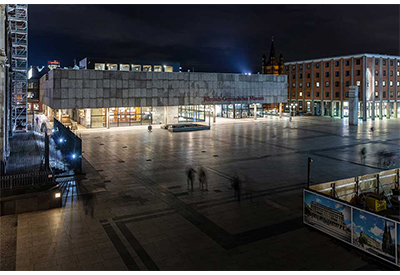Signify’s Connected Lighting Brings Cologne Closer to Becoming Germany’s First Smart City

March 17, 2020
Signify will help the city of Cologne, Germany to become a Smart City by connecting all of the city’s 85,000 light points to its Interact City lighting management system. This will improve the safety and quality of life of the citizens of the Rhine metropolis, increase the city’s energy efficiency and reduce costs. The system can also accommodate the integration of sensors into the luminaires, providing data that offer environmental benefits that go beyond lighting. RheinEnergie AG, which is responsible for the city’s lighting, will replace all the light points with connected luminaires within the next 15 years.
Cologne, Germany’s fourth largest city, is one of the nation’s leading cities in the field of digitalization. Together with energy partner RheinEnergie AG and other participating companies, associations and institutions, it’s committed to developing a so-called Smart City and becoming one of Germany’s first Smart Cities. That is why the city in January 2019 started to successively convert its more than 85,000 public lighting points to digital and networked lighting, connected to Interact City.
“Public lighting is essential for people to feel comfortable in a city. This is why we have always been involved in this area in a variety of ways. In Signify, we have found a partner whose system can help us to drastically reduce the energy usage for urban lighting and at the same time keep Cologne shining in the best light, In Signify, we have found a partner whose system can help us to drastically reduce the energy usage for urban lighting and at the same time keep Cologne shining in the best light.” says Dr. Andreas Cerbe, RheinEnergie’s network director.
Interact City enables RheinEnergie to continuously monitor and manage all the lights from a single dashboard. This makes planning of maintenance and repairs more efficient and provides RheinEnergie with information and data on the performance and status of the light points for analyses, reports and evaluations. These operational benefits were key factors for Cologne’s leading energy supplier in choosing Signify.
Additionally, the system enables the integration of sensors on the luminaires, e.g. for measuring environmental data or traffic flows, thus providing reliable data for sustainable and future-oriented urban development. Thanks to open interfaces (APIs), the system is also integrated into RheinEnergie’s SAP system, combining luminaire inventory data with RheinEnergie’s accounting and purchasing data. Signify’s Interact City connected lighting system thus offers cities such as Cologne a comprehensive and stable digital infrastructure for the various public systems and supports their path to becoming a Smart City.
“We are proud that Cologne and RheinEnergie have chosen Signify for the digitalization of their lighting. Together, we’re showing how connected lighting can play a central role in helping modern cities increase their attractiveness, improve the quality of life and become more sustainable.” says Karsten Vierke, Market Leader of Signify’s activities in the DACH region.
Connectivity for the city of tomorrow
Interact City is a connected lighting system that allows public light points, such as streetlights, to be networked together and remotely monitored and controlled via a central dashboard. This enables cities and municipalities to individually control the lighting levels of light points and better manage their lighting assets. A central aspect of city lighting is the safety and sense of security of the citizens. On top of preventing risks by illuminating lonely places such as parks or tunnels at night, connected lighting can also be adapted to special requirements and events. Lighting can be immediately adjusted to a brighter level if necessary, allowing the system to react to events that affect the safety of citizens. For example, the lighting turned up to help first responders responding to an emergency call.
Signify has already equipped several major cities worldwide with connected LED lighting and lighting management systems, for example Los Angeles, Buenos Aires, and Pune, India. Connected lighting as part of the digitalization of urban infrastructures creates places that are technologically advanced, energy efficient, low in emissions and resource efficient. In this way, the company helps cities such as Cologne to set the course to become a safer, smarter, more sustainable city and improve the quality of life for all its citizens.









![Guide to the Canadian Electrical Code, Part 1[i], 26th Edition– A Road Map: Section 56](https://electricalindustry.ca/wp-content/uploads/2022/11/Guide-CE-Code-2.png)






